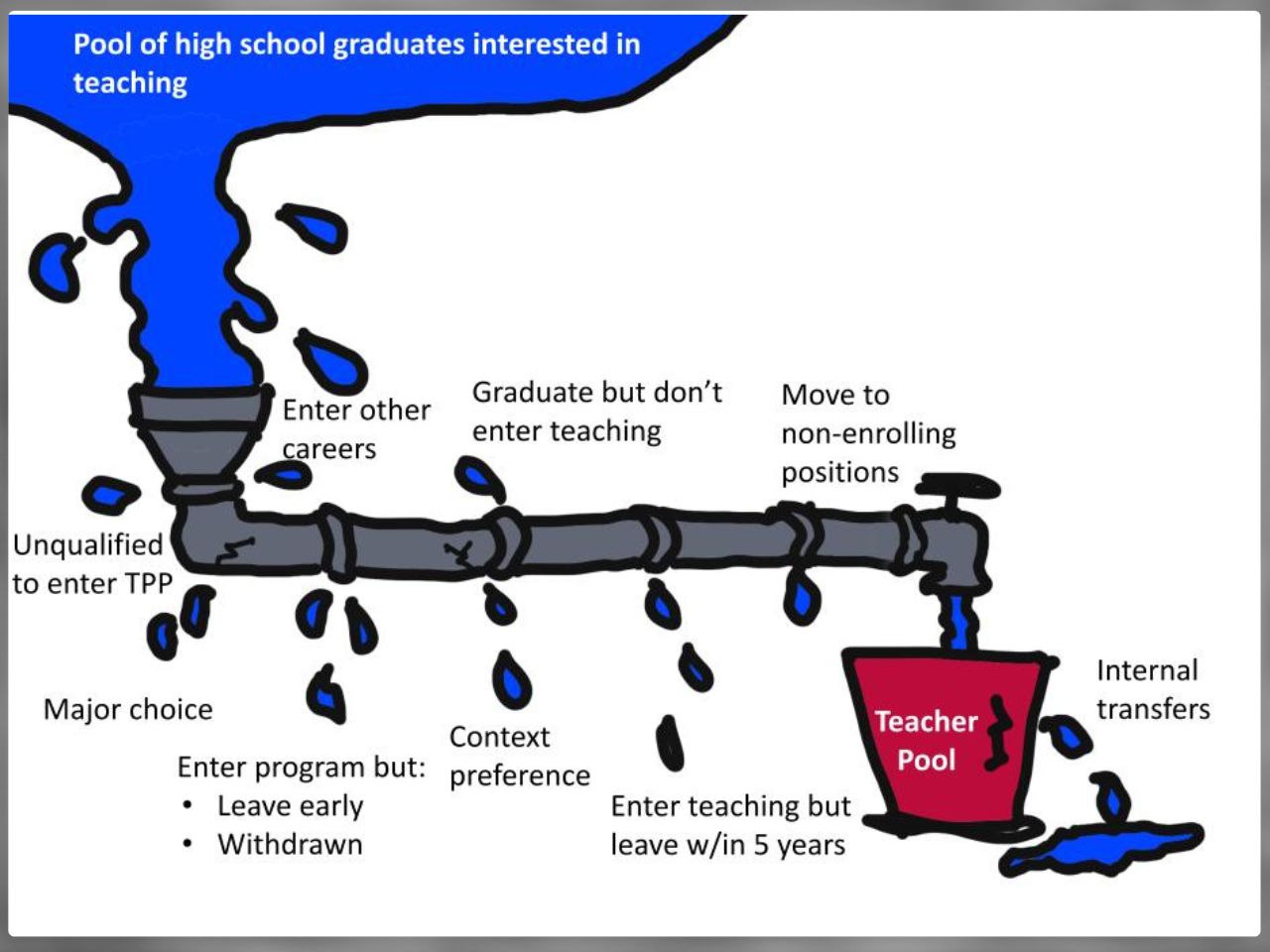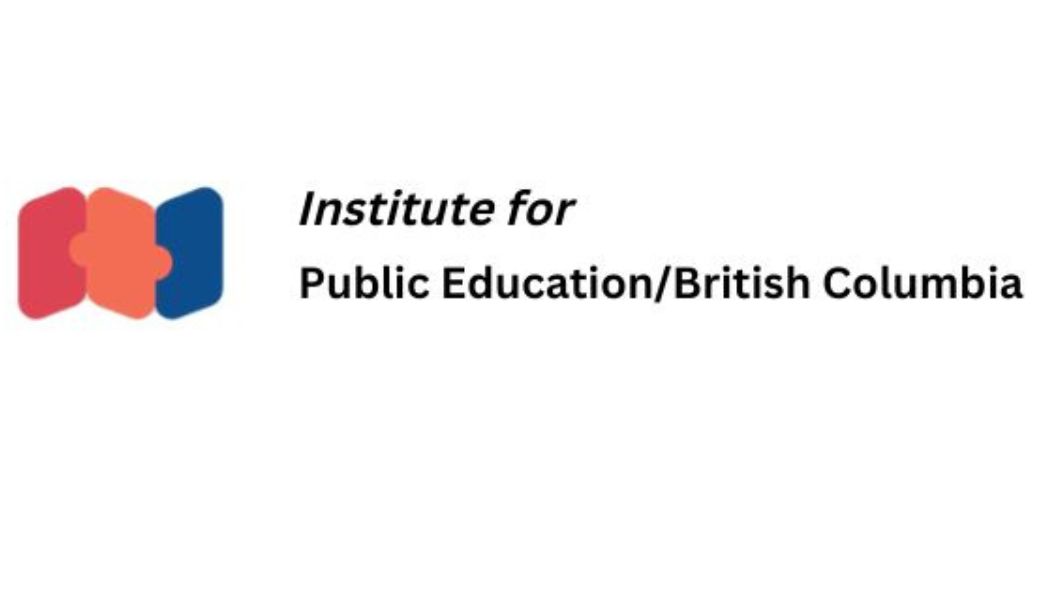IPE/BC News April 2024
April 19, 2024 Newsletter 9
IPE/BC News

Public Education is a Public Good
IPE/BC forum on the teacher shortage

Thanks very much to Dr. Dan Laitsch, Dean of the Faculty of Education at SFU, who addressed the teacher shortage and its impact on staff and students and engaged participants in a valuable discussion at the IPE/BC AGM Forum on March 7th. He stressed the importance of a comprehensive system-wide plan that paid attention to each point on the teacher education, recruitment and retention continuum. Dan used the pipeline image above to make clear that we need to collectively ensure there is a response for each “leakage point” where potential teacher candidates and current teachers are being lost to other pursuits. We certainly appreciated being able to draw on Dan’s leadership on this critical issue.
Thank you also to all those who participated in the forum online and in person. For more details, please see the full summary of the forum on our website.
Featured in our Perspectives Blog

Thanks very much to our recent Perspectives Blog contributors. If you haven’t yet had a chance to read their posts, please check them out.
• John Malcolmson: “Reflections on the teacher shortage: How teachers are paid reinforces the problem.”
“Young and inexperienced educators are placed in particularly challenging classroom environments for the early parts of their careers. Their teaching labour is exploited by virtue of substandard pay for this period. Their affective labour and emotional commitment to the work they perform is likewise exploited. Mental and emotional energy is extracted piecemeal by the demands of the job"
• Shannon Leddy: “Decolonizing dialogues: The auto-pedagogical potential of encounters with Indigenous art.”
“Art, in nearly all of its forms, has the power to show us what we thought we knew, reveal to us what we don’t know, and point us in the direction of the relearning we need to do. Further, these counters are not only suitable for post-secondary contexts – this work can be done in any classroom, with students of all ages and does not require the teacher to be completely fluent in the process. We are never too old to co-learn with our students, and may we always remain humble enough to do so.”
• Patti Bacchus: “The IPE/BC welcomes the Prime Minister’s April 1st National School Meals Program announcement”.
““Having good food available at school would reduce busy families’ financial and time pressures, expose kids to a wide range of healthy foods, remove the stigma of current food programs that are targeted only to kids from poor families and support local food production. That’s a lot of bang for the bucks it would take to fund the program and could save taxpayers’ money in the long run."
Reaching out - Making connections
IPE/BC is very grateful for the opportunity to connect with other organizations supporting quality, accessible, inclusive public education. Here are just a few examples of the outreach work we’ve been engaged with since we reported to you in the January newsletter.
- We staffed an information table at the BCTF Annual General Meeting in March and had many great discussions with the teacher delegates who shared the challenges they face along with their pride in the work they do on behalf of students, families, and communities.
-We’re looking forward to the upcoming BCCPAC spring conference at the beginning of May and will also be at the conference for DPAC reps in the fall. The opportunity to talk about public education with parent leaders at the school, district, and provincial levels will be invaluable.
-At the end of May, we’ll be at Inclusion BC’s conference, Everybody Belongs, and will be presenting a workshop on our Hopes and Dreams project. We feel very privileged to be a part of this conference and are looking forward to learning from other presenters and participants.
-We are putting plans in place to talk about public education hopes and dreams with early career teachers in Chilliwack, the members of the BC Federation of Labour Executive Council, teachers, parents and members of the public in Nanaimo and other locations, and more.
If you’re connected to an organization that has a meeting or conference coming up, we’d certainly appreciate being invited to talk with your participants in person or online. We can be reached at info@PROTECTED.
2024 K-12 funding analysis

Shortly after BC’s Budget 2024 was tabled, John Malcolmson, IPE/BC Board member, analyzed the funding allotted to education. In his report, BC Budget 2024;What's in store for public schools and the K-12 system as a whole?", you'll see that:
-the urgent need to address teacher recruitment and retention is not referenced in the budget.
-capital funding for building new schools has been increased in light of the enrolment pressures but there is no additional funding for refurbishments of existing schools.
-there is $636 million in additional funding for school operations however much of that will be directed towards existing commitments.
-private schools funding has been increased by 14.5% to a total of more than $570 million next year. IPE/BC is firmly of the opinion that public education is a public good and our public tax dollars should go to public schools.
Capital planning and building process not working

On April 5th, the provincial government announced that the long-considered elementary school in Olympic Village, Vancouver, will proceed with the necessary funding. This is good news, to be sure. However, it’s important to note that the plans for this school have been under discussion for at least a decade and the construction won’t be completed for another five years.
This is just one example of the urgent need to revise the current capital planning and building process. In our last submission to the Select Standing Committee on Finance and Government Services, IPE/BC called for a forward looking process, ensuring that students are not stuck in overcrowded schools and problematic portable classrooms for years before new school facilities approved and built.
Further illustrating the need for changes, Surrey School District recently announced that three schools have cut off registrations to students directly in their catchment areas due to overcrowding with more schools expected to have to do the same. This undoubtedly places additional burdens on parents/caregivers who may well be left trying to put unexpected transportation and childcare provisions in place.
These two districts are by no means the only ones facing the pressing need for new schools, upgrades and repairs. And, as we know, things only get worse when we collectively ignore or delay important infrastructure needs.
Considering cooperative models in post-secondary education
“We face unprecedented global crises. Making education a consumer good - accessible to those who pay top dollars through their own funds or increasingly through the burden of debt — is,at best, limiting the ability of higher education to expand public and policy conversations through education.
At worst, it’s contributing to the crises we face by sticking to a model that conflates individual wealth with ability. Research is clear that quality suffers when equity is overlooked in who produces knowledge and how it is funded and saps energy from innovating sustainable and equitable research."
Michelle Stack, associate professor in the department of educational studies at UBC and IPE/BC Fellow, and Caroline Shenaz Hossein, associate professor of global development and political economy at the University of Toronto Scarborough, co-authored, “Universities should respond to cuts and corporate influence with co-operative governance." The article presents a compelling argument for the many benefits of cooperative models in general and their application to universities in particular.
What if the glass was full?

When we think about public education quality, funding and resources, we can get caught up in talking about whether we see the glass as half empty or half full. Perhaps we consider that, despite all the issues and pressing needs, the school system is still doing its best to meet students needs. Or we picture a glass half empty with our public schools struggling to meet the challenges they face and being defeated in the process. But…what if we pictured a full glass instead? What would it look like?
IPE/BC is asking British Columbians to engage in imagining that full glass and sharing their hopes and dreams for public education. In a time when public schools, families, students and staff are dealing with many complex problems, it’s important to envision the possibilities and work together to make them a reality in our public schools. If you haven’t already done so, please contribute your perspectives to our Hopes and Dreams project.
Planning session ahead
On April 20th, the IPE/BC board will be holding a planning session to review current projects and initiatives and discuss our priorities for the year ahead. We’ll be sending you a report on the session and hope that you’ll send us your reactions and suggestions as well. Please don’t hesitate to get in touch at info@PROTECTED.
Welcome to Patti, Rory, Kirsten, Annabree and Janice

We’re delighted to welcome five new IPE/BC board members. The recent Annual General Meeting appointed Patti Bacchus, Rory Brown, Kirsten Daub, Annabree Fairweather and Janice St. Helene, bringing the total number on our board to thirteen
Patti Bacchus is a public education advocate and commentator, who was also the Vancouver School Board’s longest-serving chair, from 2008-2014. She has written extensively on education issues for the Georgia Strait.
Rory Brown is a BCIT faculty member in the Columbia Institute of Technology in the Mechanical Engineering Department, Technology Teacher Education Program. He is also an experienced secondary school teacher and teacher leader.
Kirsten Daub is the K-12 Sector Coordinator for the Canadian Union of Public Employees in British Columbia (CUPE BC Region) and is a CUPE National Servicing Representative. Kirsten also worked for over ten years at Co-Development Canada.
Annabree Fairweather is the Executive Director Confederation of University Faculty Associations of British Columbia (CUFA BC). She has over a decade of experience in post-secondary academic labour in BC and Alberta.
Janice St. Helene is the Director of Professional Programs, supporting both the in-service and pre-service teacher education programs at SFU. She has extensive experience in education as an elementary teacher, principal, faculty associate and coordinator in the Faculty of Education at SFU.
Our new directors will be joining Steve Cardwell, Chairperson, David Chudnovsky, Larry Kuehn, Moira Mackenzie, John Malcolmson, Kevin Millsip, Bárbara Silva, and Bryn Williams on the board.
Report of the UN high level panel
The United Nations’ High Level Panel on the Teaching Profession, established in 2022 by Secretary-General António Guterres, was given the task of “setting out a clear plan of action on how the teaching profession can be supported and transformed to play its essential role in creating a better world.”
The panel was made up of 18 members representing government ministers ofeducation and labour, representatives of teacher trade unions, academics, civil society leaders and teachers and students representing every continent.
The panel’s incredibly comprehensive report, supported jointly by UNESCO and the ILO, was released on February 26th this year and includes recommendations in each of the following areas:
• An urgent call to action (on the teacher shortage)
• Enabling the transformation of the teaching profession
• Investing in teachers
• Promoting equity, diversity and inclusion
• Elevating the status and diversity of the teaching profession
• Improving quality and fostering innovation in teaching through training and life-
long learning
• Ensuring sustainability, peace and democracy.
• Fostering humanity in teaching through decent work
• Developing leadership in teaching
• Advancing human-centered education technology
• Transforming teaching through a new social contract for education and social dialogue
• Next steps for international action.
Secretary-General Guterres has urged all member countries, education partners and teacher unions to review the recommendations carefully and consider ways to implement them in their own jurisdictions. We encourage you to read the full report, share it widely, and consider letting your MLA and MP know how important the recommendations are.
Please get in touch

We’d love to hear from you. Are you interested in writing a blog post for IPE/BC? Are there education issues you’d like to discuss with us? Perhaps there are research reports, books, interviews or articles you’ve written or ones that you’d like to recommend we include in the IPE/BC Commons. Please don’t hesitate to contact us at info@PROTECTED. Please feel free to share this newsletter with your contacts and encourage them to subscribe.

- This mailing list is a public mailing list - anyone may join or leave, at any time.
-
This mailing list is announce-only.
News and information from IPE/BC
Privacy Policy:
IPE/BC will only contact you about relevant IPE/BC news and information. You information will remain confidential and will not be shared with other individuals or organizations.
